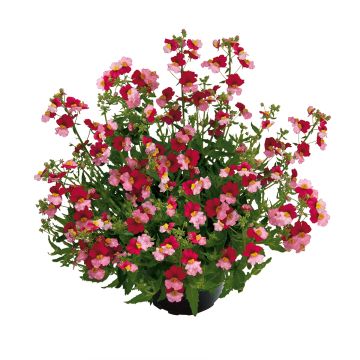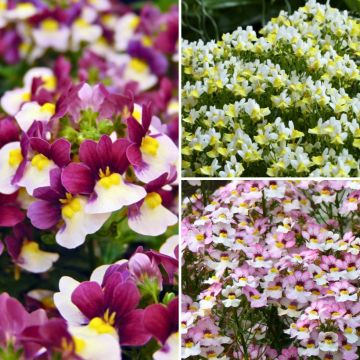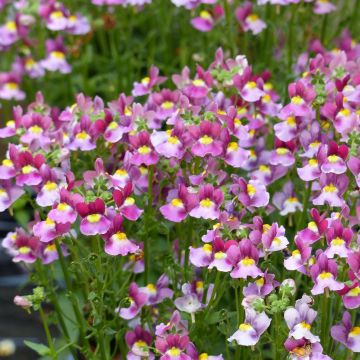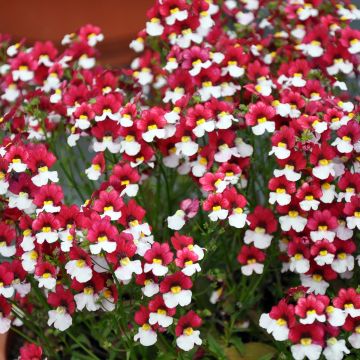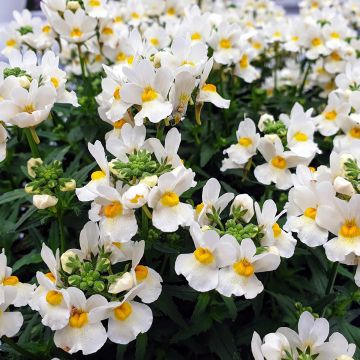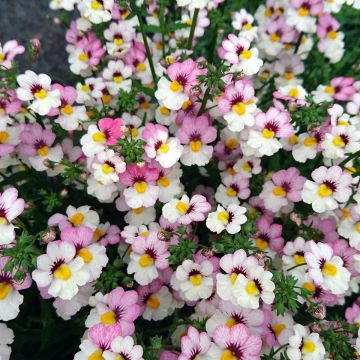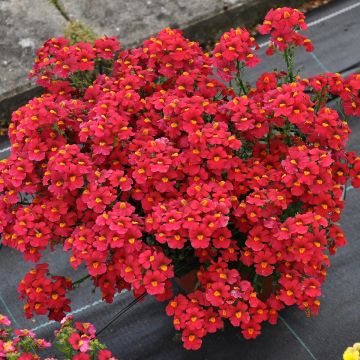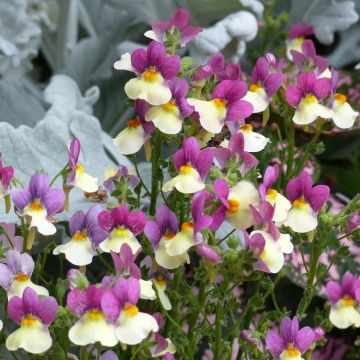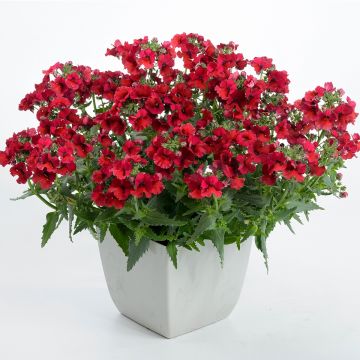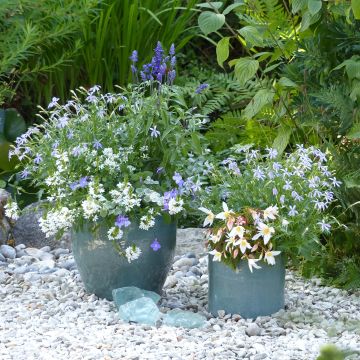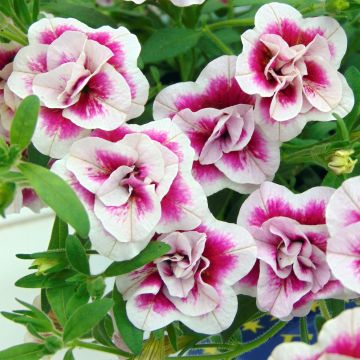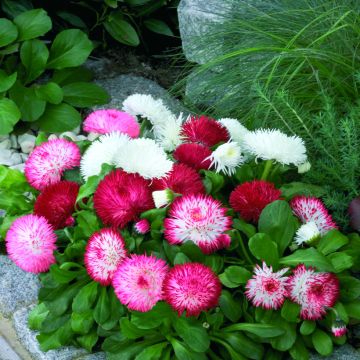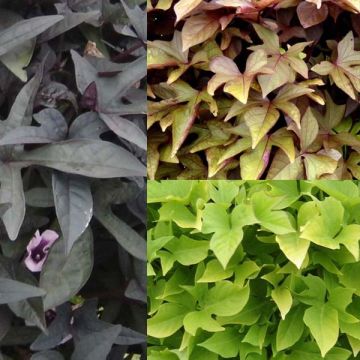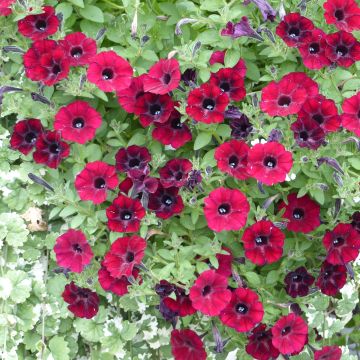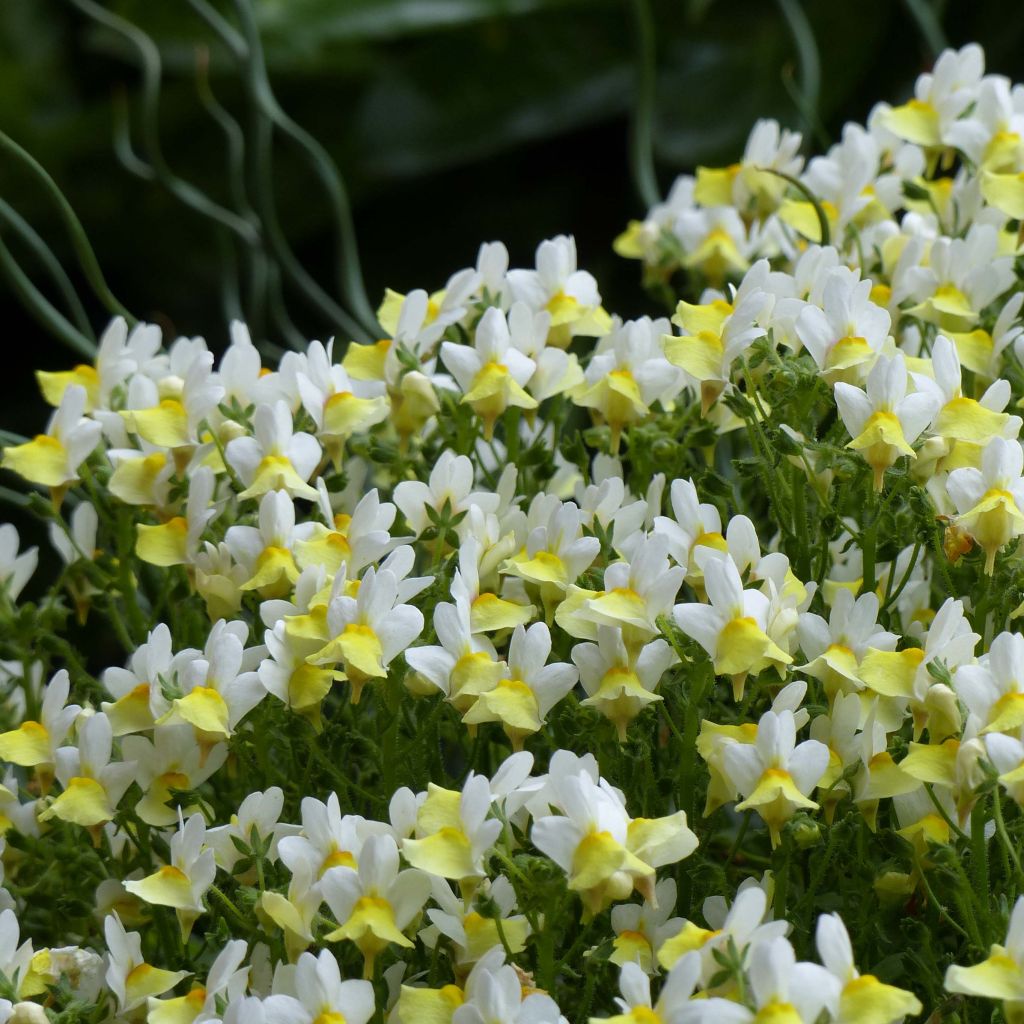

Nemesia Fairy Kisses Citrine Mini-mottes
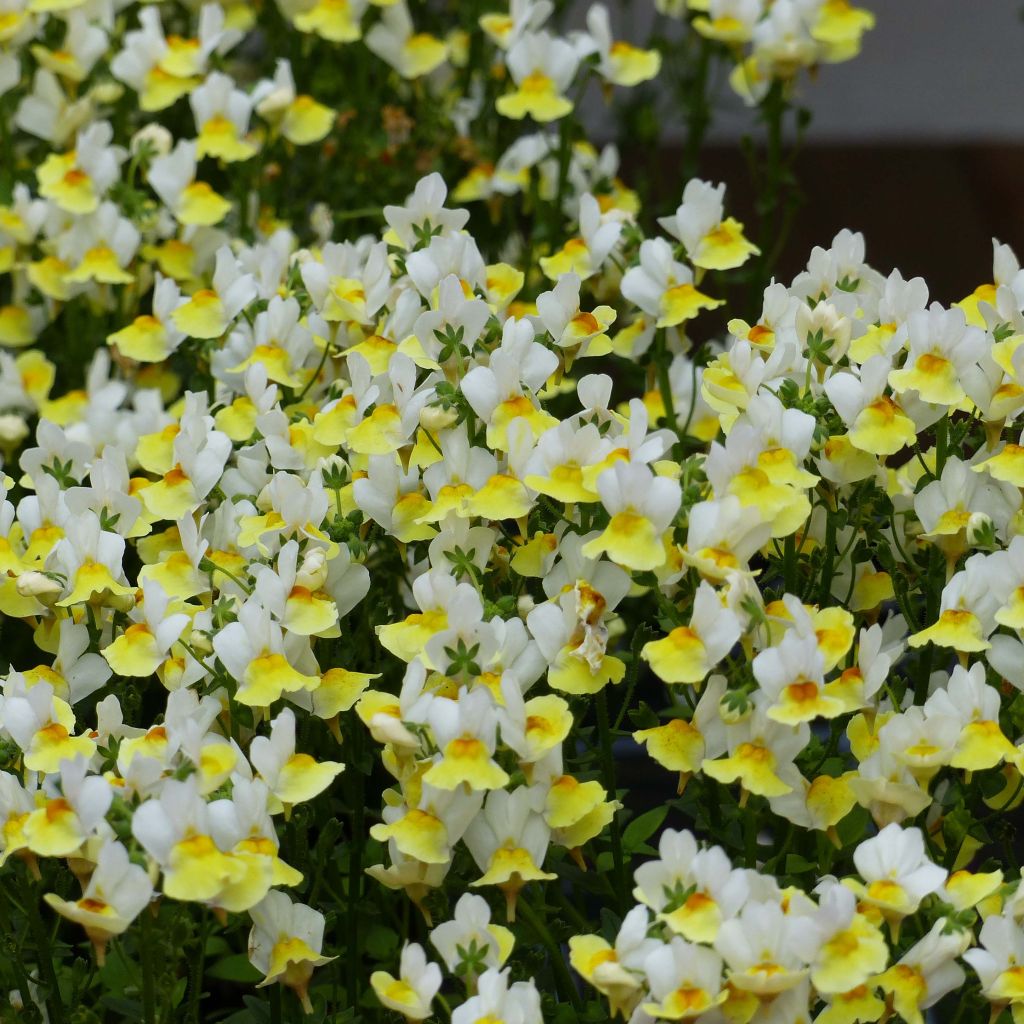

Nemesia Fairy Kisses Citrine Mini-mottes
Nemesia Fairy Kisses Citrine
Nemesia Fairy Kisses Citrine
Nemesia, Cape Jewels
Received seedlings in perfect condition, can't wait to see them bloom.
Pascale, 29/03/2020
This item cannot be shipped to the selected country
Delivery charge from €5.90
More information
Schedule delivery date,
and select date in basket
This plant carries a 6 months recovery warranty
More information
We guarantee the quality of our plants for a full growing cycle, and will replace at our expense any plant that fails to recover under normal climatic and planting conditions.
From €5.90 for pickup delivery and €6.90 for home delivery
Express home delivery from €8.90.
Does this plant fit my garden?
Set up your Plantfit profile →
Description
The 'Fairy Kisses Citrine' Nemesia is a brand new variety of Nemesia from the 'Fairy Kisses' series, known for its remarkable floriferousness, compact habit, and the bright colour of its small flowers, which are also pleasantly fragrant. Its bicoloured corollas, in vivid lemon yellow and white, bloom in abundance and almost continuously, creating a stunning cloud-like effect in hanging baskets and containers. Its well-branched growth gives it good resilience to adverse weather conditions. It should be placed in a gently sunny position, in fertile and well-drained soil.
Nemesia strumosa, also known as African Nemesia, is a perennial plant from the Scrophulariaceae family, native to South Africa, with rapid growth. Its low frost tolerance means that it is commonly grown as an annual in European latitudes. It is the source of numerous horticultural varieties, whose floriferousness and longevity are constantly being improved. The 'Fairy Kisses Citrine' cultivar is one of these fantastic new creations, offering almost continuous and fragrant flowering from May to October on well-branched and upright plants.
'Fairy Kisses Citrine' produces a multitude of charming symmetrical flowers, less than 1 cm (0in) in size, half lemon yellow and half pure white. They are centred around a golden yellow throat that is noticeable from a distance, and exude a very pleasant scent of honey and vanilla that attracts pollinating insects. Gathered at the end of sturdy, leafy stems, these flowers appear to float above a graceful 30 cm (12in) tuft, with a dense, rounded, and upright habit. The foliage consists of small, lanceolate, deeply toothed, grey-green leaves. This well-branched plant is resistant to wind and rain. It is hardy down to approximately -3°C (26.6°F).
From the early days of spring, the vibrant or pastel colours of Nemesias brighten the flowerbeds in cities and villages. With their extremely graceful habit, both dense and light, these fresh plants are perfect for hanging baskets, balcony planters, all types of containers, and even perennial borders, preferably in full sun. They are easy to grow in the garden and yield spectacular results when planted in containers. Use them as edging, in mixed colours, or in combination with geraniums, lobelias, verbenas, petunias, etc.
Note: Please be aware that our plug plants are professional products intended for experienced gardeners: upon receipt, transplant and store them under cover (veranda, greenhouse, cold frame) at a temperature above 14°C (57.2°F) for a few weeks before planting them outdoors once the risk of frost has passed.
Report an error about the product description
Nemesia Fairy Kisses Citrine in pictures
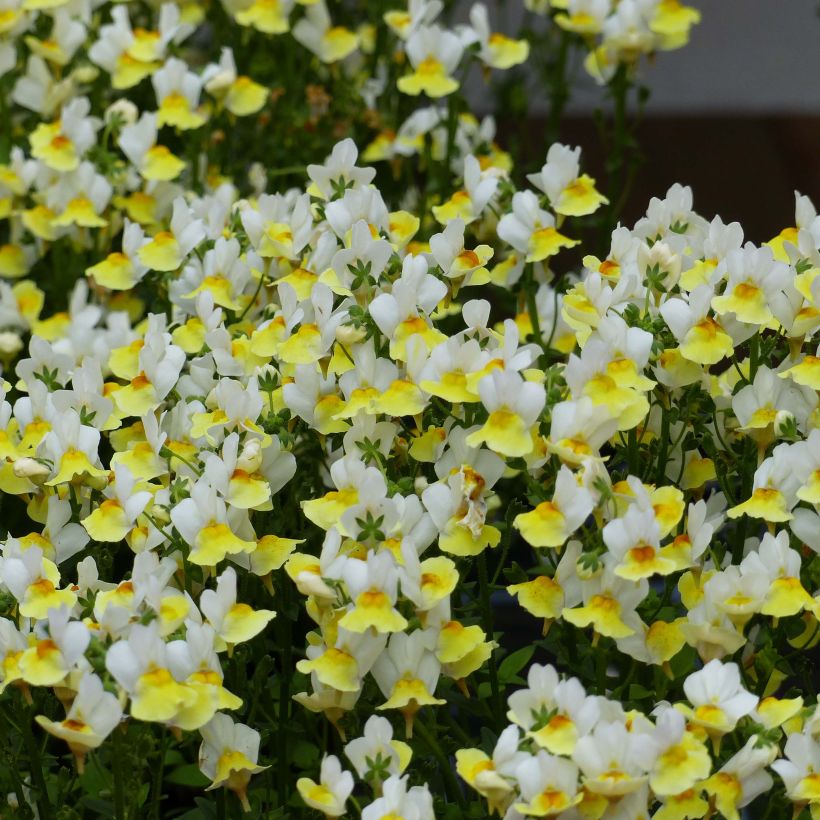

Flowering
Foliage
Plant habit
Botanical data
Nemesia
Fairy Kisses Citrine
Scophulariaceae
Nemesia, Cape Jewels
Cultivar or hybrid
Other Nemesia
Planting and care
Plant your Fairy Kisses Citrine Nemesias in a sunny location or possibly in partial shade. They need a light, fertile and humus-rich soil and appreciate a fertiliser supplement. They tolerate high temperatures combined with significant humidity quite poorly. You can plant your nemesias in a flowerbed as well as in pots. In pots, these plants need to be regularly watered. Planting should be done after the last frost, in spring. In summer, during periods of high heat, do not hesitate to prune the plant severely (10-15 cm (4-6in) from the base) between two flowering periods to encourage the formation of new flowering shoots.
Planting period
Intended location
Care
-
, onOrder confirmed
Reply from on Promesse de fleurs
Plug plants - Annuals
Haven't found what you were looking for?
Hardiness is the lowest winter temperature a plant can endure without suffering serious damage or even dying. However, hardiness is affected by location (a sheltered area, such as a patio), protection (winter cover) and soil type (hardiness is improved by well-drained soil).

Photo Sharing Terms & Conditions
In order to encourage gardeners to interact and share their experiences, Promesse de fleurs offers various media enabling content to be uploaded onto its Site - in particular via the ‘Photo sharing’ module.
The User agrees to refrain from:
- Posting any content that is illegal, prejudicial, insulting, racist, inciteful to hatred, revisionist, contrary to public decency, that infringes on privacy or on the privacy rights of third parties, in particular the publicity rights of persons and goods, intellectual property rights, or the right to privacy.
- Submitting content on behalf of a third party;
- Impersonate the identity of a third party and/or publish any personal information about a third party;
In general, the User undertakes to refrain from any unethical behaviour.
All Content (in particular text, comments, files, images, photos, videos, creative works, etc.), which may be subject to property or intellectual property rights, image or other private rights, shall remain the property of the User, subject to the limited rights granted by the terms of the licence granted by Promesse de fleurs as stated below. Users are at liberty to publish or not to publish such Content on the Site, notably via the ‘Photo Sharing’ facility, and accept that this Content shall be made public and freely accessible, notably on the Internet.
Users further acknowledge, undertake to have ,and guarantee that they hold all necessary rights and permissions to publish such material on the Site, in particular with regard to the legislation in force pertaining to any privacy, property, intellectual property, image, or contractual rights, or rights of any other nature. By publishing such Content on the Site, Users acknowledge accepting full liability as publishers of the Content within the meaning of the law, and grant Promesse de fleurs, free of charge, an inclusive, worldwide licence for the said Content for the entire duration of its publication, including all reproduction, representation, up/downloading, displaying, performing, transmission, and storage rights.
Users also grant permission for their name to be linked to the Content and accept that this link may not always be made available.
By engaging in posting material, Users consent to their Content becoming automatically accessible on the Internet, in particular on other sites and/or blogs and/or web pages of the Promesse de fleurs site, including in particular social pages and the Promesse de fleurs catalogue.
Users may secure the removal of entrusted content free of charge by issuing a simple request via our contact form.
The flowering period indicated on our website applies to countries and regions located in USDA zone 8 (France, the United Kingdom, Ireland, the Netherlands, etc.)
It will vary according to where you live:
- In zones 9 to 10 (Italy, Spain, Greece, etc.), flowering will occur about 2 to 4 weeks earlier.
- In zones 6 to 7 (Germany, Poland, Slovenia, and lower mountainous regions), flowering will be delayed by 2 to 3 weeks.
- In zone 5 (Central Europe, Scandinavia), blooming will be delayed by 3 to 5 weeks.
In temperate climates, pruning of spring-flowering shrubs (forsythia, spireas, etc.) should be done just after flowering.
Pruning of summer-flowering shrubs (Indian Lilac, Perovskia, etc.) can be done in winter or spring.
In cold regions as well as with frost-sensitive plants, avoid pruning too early when severe frosts may still occur.
The planting period indicated on our website applies to countries and regions located in USDA zone 8 (France, United Kingdom, Ireland, Netherlands).
It will vary according to where you live:
- In Mediterranean zones (Marseille, Madrid, Milan, etc.), autumn and winter are the best planting periods.
- In continental zones (Strasbourg, Munich, Vienna, etc.), delay planting by 2 to 3 weeks in spring and bring it forward by 2 to 4 weeks in autumn.
- In mountainous regions (the Alps, Pyrenees, Carpathians, etc.), it is best to plant in late spring (May-June) or late summer (August-September).
The harvesting period indicated on our website applies to countries and regions in USDA zone 8 (France, England, Ireland, the Netherlands).
In colder areas (Scandinavia, Poland, Austria...) fruit and vegetable harvests are likely to be delayed by 3-4 weeks.
In warmer areas (Italy, Spain, Greece, etc.), harvesting will probably take place earlier, depending on weather conditions.
The sowing periods indicated on our website apply to countries and regions within USDA Zone 8 (France, UK, Ireland, Netherlands).
In colder areas (Scandinavia, Poland, Austria...), delay any outdoor sowing by 3-4 weeks, or sow under glass.
In warmer climes (Italy, Spain, Greece, etc.), bring outdoor sowing forward by a few weeks.

































